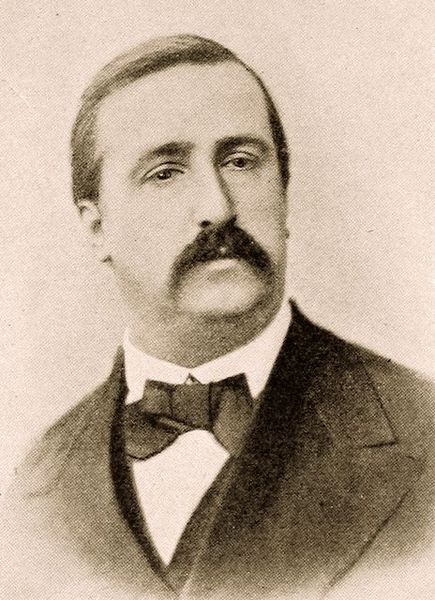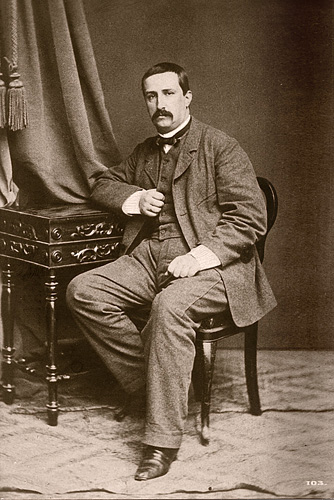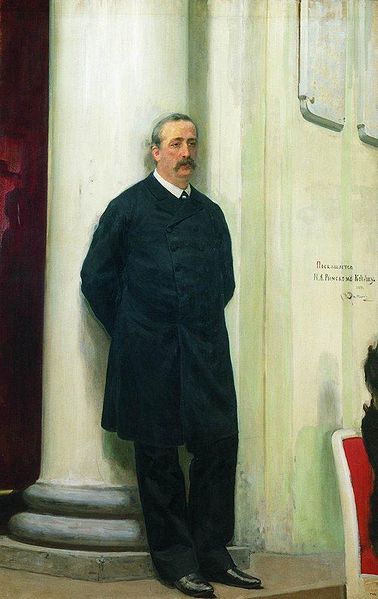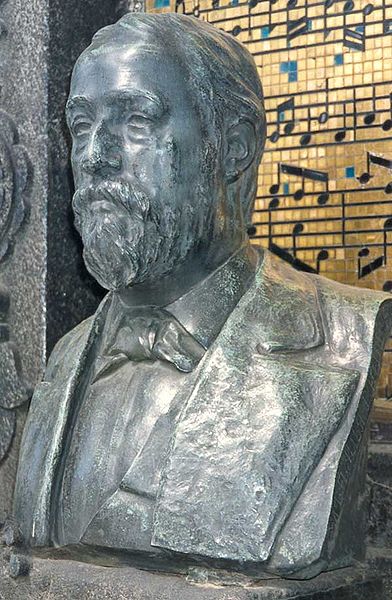<Back to Index>
- Composer Alexander Porfiryevich Borodin, 1833
PAGE SPONSOR



Alexander Porfiryevich Borodin (12 November 1833 – 27 February 1887) was a Russian Romantic composer and chemist of Georgian – Russian parentage. He was a member of the group of composers called The Five (or "The Mighty Handful"), who were dedicated to producing a specifically Russian kind of art music. He is best known for his symphonies, his two string quartets, and his opera Prince Igor. Music from Prince Igor and his string quartets was later adapted for the US musical Kismet.
Borodin was born in Saint Petersburg, the illegitimate son of a Georgian noble, Luka Gedevanishvili (Georgian: ლუკა სიმონის ძე გედევანიშვილი) and a 24 year old Russian woman, Evdokia Konstantinovna Antonova (Евдокия Константиновна Антонова). The nobleman had him registered as the son of one of his serfs, Porfiry Borodin. As a boy he received a good education, including piano lessons. He entered the Medico – Surgical Academy in 1850, which was later home to Ivan Pavlov, and pursued a career in chemistry. On graduation he spent a year as surgeon in a military hospital, followed by three years of advanced scientific study in western Europe.
In 1862 Borodin became a professor of chemistry at the Academy of Medicine, and eventually was able to establish medical courses for women (1872). He spent the remainder of his life lecturing and overseeing the education of others.
He began taking lessons in composition from Mily Balakirev in 1862. He married Ekaterina Protopopova, a pianist, in 1863. Music
remained a secondary vocation for Borodin outside of his main career as
a chemist and physician. He suffered poor health, having overcome cholera and several minor heart attacks. He died suddenly during a ball at the Academy, and was interred in Tikhvin Cemetery at the Alexander Nevsky Monastery, in Saint Petersburg.
In his profession Borodin gained great respect, being particularly noted for his work on aldehydes. Between 1859 and 1862 Borodin held a postdoctorate in Heidelberg. He worked in the laboratory of Emil Erlenmeyer working on benzene derivatives. He also spent time in Pisa, working on organic halogens. One experiment published in 1862 described the first nucleophilic displacement of chlorine by fluorine inbenzoyl chloride. A related reaction known to the West as the Hunsdiecker reaction published in 1939 by the Hunsdieckers was promoted by the Soviet Union as the Borodin reaction. In 1862 he returned to the Medico – Surgical Academy, where he worked on self - condensation of small aldehydes. He published papers in 1864 and 1869, and in this field he found himself competing with August Kekulé.
Borodin is co-credited with the discovery of the Aldol reaction, with Charles - Adolphe Wurtz. In 1872 he announced to the Russian Chemical Society the discovery of a new by-product in aldehyde reactions with alcohol - like properties, and he noted similarities with compounds already discussed in publications by Wurtz from the same year.
He published his last full article in 1875 on reactions of amides and his last publication concerned a method for the identification of urea in animal urine.
His son - in - law and successor was fellow chemist A.P. Dianin.
Borodin met Mily Balakirev in 1862. While under Balakirev's tutelage in composition he began his Symphony No. 1 in E flat major; it was first performed in 1869, with Balakirev conducting. In that same year Borodin started on his Symphony No. 2 in B minor, which was not particularly successful at its premiere in 1877 under Eduard Nápravník, but with some minor re-orchestration received a successful performance in 1879 by the Free Music School under Rimsky - Korsakov's direction. In 1880 he composed the popular symphonic poem In the Steppes of Central Asia. Two years later he began composing a third symphony, but left it unfinished at his death; two movements of it were later completed and orchestrated by Glazunov.
In 1868 Borodin became distracted from initial work on the second symphony by preoccupation with the opera Prince Igor, which is seen by some to be his most significant work and one of the most important historical Russian operas. It contains the Polovtsian Dances,
often performed as a stand alone concert work forming what is probably
Borodin's best known composition. Borodin left the opera (and a few
other works) incomplete at his death. Prince Igor was
completed posthumously by Rimsky - Korsakov and Glazunov. It is set in
the 12th century, when the barbarous Polovtsians invaded southern
Russia. The story tells of the capture of Prince Igor and son Vladimir
of Russia by Polovtsian leader Khan Konchak, who entertains his
prisoners lavishly and calls on his slaves to perform the famous
Polovtsian dances, which provide a thrilling climax to the second act.
No other member of the Balakirev circle identified himself so openly with absolute music as did Borodin in his two string quartets. Himself a cellist, he was an enthusiastic chamber music player, an interest deepened during his chemical studies in Heidelberg between 1859 and 1861. This early period yielded, among other chamber works, a string sextet and a piano quintet. In thematic structure and instrumental texture he based his pieces on those of Felix Mendelssohn.
In 1875 Borodin started his First String Quartet, much to the displeasure of Mussorgsky and Vladimir Stasov.
That Borodin did so in the company of The Five, who were hostile to
chamber music, speaks to his independence. From the First Quartet on he
displayed mastery in the form. His Second Quartet, in which his strong lyricism is represented in the popular "Nocturne"
followed in 1881. The First Quartet is richer in changes of mood. The
Second Quartet has a more uniform atmosphere and expression.
Borodin's fame outside the Russian Empire was made possible during his lifetime by Franz Liszt, who arranged a performance of the Symphony No. 1 in Germany in 1880, and by Comtesse de Mercy - Argenteau in Belgium and France. His music is noted for its strong lyricism and rich harmonies. Along with some influences from Western composers, as a member of The Five his music exudes also an undeniably Russian flavor. His passionate music and unusual harmonies proved to have a lasting influence on the younger French composers Debussy and Ravel (in homage, the latter composed in 1913 a piano piece entitled "À la manière de Borodine").
The evocative characteristics of Borodin's music made possible the adaptation of his compositions in the 1953 musical Kismet, by Robert Wright and George Forrest, perhaps most notably in the song, "Stranger in Paradise". In 1954, Borodin was posthumously awarded a Tony Award for this show.
- Borodin's music is full of romantic charm and enticing melody, and much of it also rings with the pageantry and landscape of old Russia; of onion - domed churches, richly decorated icons, and the vastness of the land. (Betty Fry)
